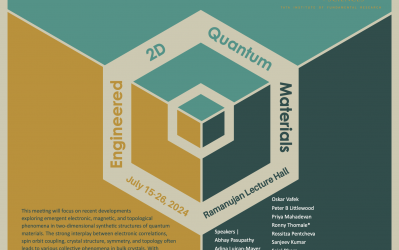This meeting will focus on recent developments exploring emergent electronic, magnetic, and topological phenomena in two-dimensional synthetic structures of quantum materials. The strong interplay between electronic correlations, spin orbit coupling, crystal structure, symmetry, and topology often leads to various collective phenomena in bulk crystals. With reduced dimensionality, the frustrated coupling across 2D interfaces or enhanced interlayer interactions between different quantum materials can lead to new electronic band structures (e.g., flat bands) and to host emergent behaviour which are unattainable otherwise in the constituent bulk systems.
This workshop will bring together physicists and materials scientists interested in artificially engineered heterostructures including oxide interfaces, oxide heterostructures, twisted van der Waals materials, twisted cuprates, and other novel moire or layered materials. The participants will have complementary experimental and theoretical expertise, including materials growth, novel spectroscopies, transport studies, microscopy, scattering, pump-probe techniques, device physics, density functional theory, dynamical mean field theory (DMFT), density matrix renormalization group (DMRG), and quantum field theory.
The following topics will be covered:
1. Magnetism and Topological superconductivity in vdW materials
2. Flat bands and band topology in twisted vdW heterostructures
3. Correlated phenomena in twisted vdW heterostructures
4. Twisted cuprate superconductors and twisted magnetic materials
5. Kondo lattice and heavy fermion physics in heterostructures
6. Skyrmions and topological magnetic textures at complex oxide interfaces
7. Superconductivity at oxide interfaces and films (nickelates, KTaO3, etc)
8. 2D ferroelectrics and quantum paraelectrics
9. Quantum simulators using engineered 2D materials
The meeting will also have tutorial sessions by theorists and experimentalists covering the broad areas mentioned above, for graduate students and postdocs.
Partially supported by Quantek Systems/Maybell, Laser Science, Oxford Instruments and Quantum Design India.
Accommodation will be provided for outstation participants at our on campus guest house.
Eligibility Criteria: Senior undergraduates/masters (4th year or above), PhD, Postdoc, Faculty members.
ICTS is committed to building an environment that is inclusive, non-discriminatory and welcoming of diverse individuals. We especially encourage the participation of women and other under-represented groups.
 icts
icts res
res in
in

